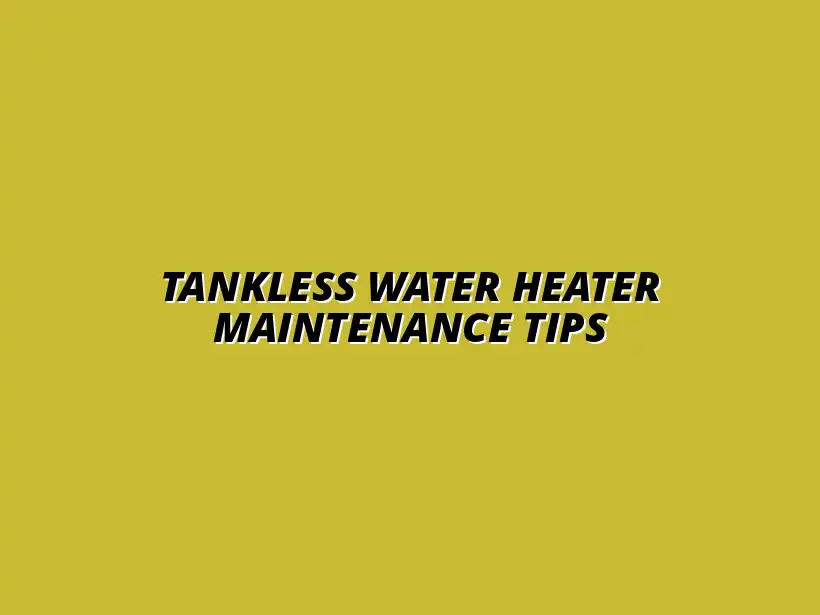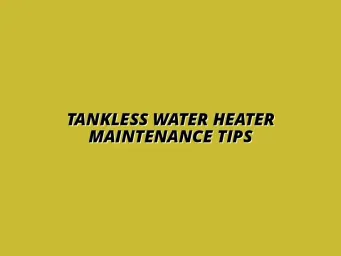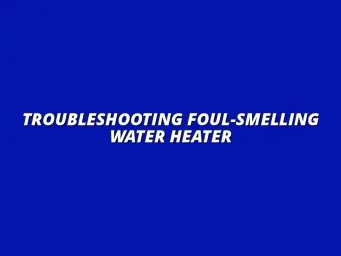
Tankless Water Heater Maintenance Tips
Understanding Tankless Water Heaters and Their Benefits
Tankless water heaters are becoming more popular for many households. Unlike traditional water heaters that store hot water in a tank, tankless units heat water on demand. This means you get hot water whenever you need it, without waiting for a tank to fill up!
These heaters come in various sizes and types to fit different needs. They can be powered by gas or electricity, and each type has its unique benefits. Understanding how they function is key to appreciating what they can do for you and your family. For efficient maintenance, check out these tips on maintaining your water heater efficiently.
The Basics of Tankless Water Heaters
What Is a Tankless Water Heater?
A tankless water heater, often called an on-demand water heater, heats water directly without the need for a storage tank. When you turn on the hot water tap, cold water travels through a pipe into the unit. It gets heated by either a gas burner or an electric element, providing you with hot water only as you use it.
This type of water heater is great for those who want to eliminate the hassle of running out of hot water during showers or dishwashing. With a tankless system, you have a steady supply of hot water, making it a convenient option for modern homes!
How Does a Tankless Water Heater Work?
Tankless water heaters operate by utilizing advanced heating technology. When hot water is needed, a flow sensor detects the water flow and activates the heating element. This process is quick and efficient, allowing for continuous hot water supply.
Additionally, the heating elements can adjust to the demand. So, if you’re using multiple outlets at once—like the shower and washing machine— the heater can handle it. This flexibility makes tankless water heaters ideal for busy households!
Advantages of Using a Tankless Water Heater
Energy Efficiency and Cost Savings
One of the biggest advantages of tankless water heaters is their energy efficiency. Since they heat water only when needed, they don’t waste energy keeping a large tank of water hot. This can lead to significant savings on your energy bill!
Many homeowners report a reduction in monthly costs after switching to a tankless system. In fact, U.S. Department of Energy studies show that homeowners can save about 24% to 34% on energy costs compared to traditional water heaters. To learn more about keeping your water heater running efficiently, consider these annual inspection tips.
Space-Saving Benefits
Tankless water heaters are compact and can be installed in smaller spaces compared to bulky tank units. This is especially useful in homes with limited storage options! You can mount them on walls or even install them outside, depending on your needs.
Thanks to their small size, you’ll have more room for storage or other appliances. This feature is a game-changer for many families looking to maximize their living space!
Longevity Compared to Traditional Water Heaters
Another significant benefit of tankless water heaters is their lifespan. On average, these units can last up to 20 years, while traditional heaters typically only last 10 to 15 years. A longer lifespan means fewer replacements and less hassle!
Proper maintenance can further extend the life of your tankless water heater. Many users find that investing in this type of system pays off in the long run due to their durability and reliability. For easy cleaning, see our guide on how to clean your water heater easily.
The Importance of Regular Maintenance for Optimal Performance
Regular maintenance is crucial for keeping your tankless water heater running efficiently. Just like a car, these units require care to function at their best. Neglecting maintenance can lead to performance drops and higher energy costs!
By investing time in proper upkeep, you can enjoy all the benefits mentioned above and avoid common issues that could arise from neglect. Regular checks can make a big difference, see our advice on regular bathroom water heater checks.
Why Maintenance Matters for Tankless Water Heaters
Impact on Efficiency and Energy Costs
When a tankless water heater is regularly maintained, it operates more efficiently. This means it uses less energy to heat water, helping to lower your utility bills. If the unit is neglected, minerals can build up and decrease its efficiency over time.
In fact, regular maintenance can help your unit run at peak performance, ensuring you get the most out of your investment. Keeping a close eye on its condition can save you money in the long run!
Preventing Common Issues and Expanding Lifespan
Regular maintenance can prevent several common issues, such as sediment buildup or scale formation. These problems can lead to costly repairs or even premature failure of the unit. By proactively addressing these concerns, you can significantly extend the lifespan of your tankless water heater!
Additionally, routine checks can help identify minor issues before they become major problems. For simple flushing tips, check out our guide on how to easily flush your water heater. This approach keeps your heater running smoothly and efficiently.
Signs That Your Tankless Water Heater Needs Attention
Reduced Hot Water Output
If you notice that your hot water supply is decreasing, it could be a sign that your tankless water heater needs maintenance. Perhaps it’s working harder due to mineral buildup, impacting its ability to heat water. If multiple taps run low on hot water, it’s time to investigate!
Addressing this issue early can prevent further complications and ensure your system continues to perform optimally.
Strange Noises from the Unit
Another indicator that your tankless water heater may need attention is unusual noises, like popping or cracking sounds. These noises can suggest that mineral deposits are forming inside the unit, which can hinder its performance over time.
Listening to your heater can provide valuable clues about its condition. If you're hearing odd sounds, consider scheduling maintenance to address the problem!
Effective Maintenance Practices for Tankless Water Heaters
Keeping your tankless water heater in great shape is essential for its performance and longevity. Regular maintenance can help you avoid costly repairs and ensure you always have hot water when you need it. Here, I'll share some effective maintenance practices that you can implement easily.
Before diving into specific tasks, it’s important to understand that a little upkeep goes a long way. By staying on top of maintenance, you can enhance energy efficiency and extend the life of your unit. Remember, the better you care for your tankless heater, the more it will serve you well!
Routine Maintenance Tasks to Consider
To keep your tankless water heater running smoothly, there are a few routine tasks you should consider doing regularly. These tasks can help maintain efficiency and prevent unexpected breakdowns. If you're experiencing drain issues, learn how to unclog your bathroom drain easily.
- Regular Descaling: Mineral buildup can affect performance. Descale your heater regularly based on water hardness.
- Cleaning Procedures: Ensure the vents and inlet screens are free from debris for optimal airflow.
- Checking Connections: Inspect all connections for leaks and secure fittings to avoid any issues.
Regular Descaling and Cleaning Procedures
Descaling is a key aspect of maintenance for tankless water heaters. It involves removing mineral deposits that can build up over time and hinder performance. Generally, this should be done every six months to a year, depending on your water's hardness.
Cleaning the exterior and other accessible parts of the unit can also make a difference. A clean heater works better and lasts longer. Use soft cloths and mild cleaners to avoid damaging any surfaces.
Checking and Replacing Filters
Another important maintenance task is to check and replace filters regularly. Clogged filters can restrict water flow and affect efficiency.
Make it a habit to check filters every few months. If you notice a drop in hot water pressure or see discoloration, it might be time to replace that filter. Keeping your filters clean ensures that your water heater functions effectively!
Recommended Frequency of Maintenance Activities
Knowing how often to perform maintenance tasks can help you stay on track and keep your tankless water heater in peak condition. Each task has its own recommended frequency for optimal care. For professional help in Birmingham, UK, check out this plumbing service.
- Descaling: Every 6-12 months, depending on your water hardness.
- Filter Replacement: Every 3-6 months, or as needed.
- Professional Inspections: Annually, to catch any potential issues early.
Annual Check-ups for Optimal Performance
Scheduling an annual check-up with a professional can really help maintain your tankless water heater's efficiency. During this inspection, a technician can thoroughly evaluate the unit for any signs of wear or damage.
These check-ups can prevent bigger problems down the road and ensure everything is functioning as it should. It’s always better to be proactive than reactive!
When to Schedule Professional Inspections
Besides the annual check-up, there are certain signs that indicate you should call in a professional sooner. If you notice fluctuating water temperatures or strange noises, it’s time to schedule an inspection.
Professional inspections can also be beneficial after extreme weather changes or if the unit has been used heavily during peak times. Keeping an eye on performance will help you determine the right time for these inspections.
Addressing Common Questions About Tankless Water Heater Maintenance
As with any appliance, it’s common to have questions about maintaining your tankless water heater. Knowing what to look for and understanding the signs of problems can help you take action.
In this section, I'll address some frequently asked questions to help you become more confident in caring for your unit!
How Can I Tell if My Tankless Water Heater is Working Properly?
Understanding the indicators of a properly functioning tankless water heater is crucial. There are a few signs that can help you gauge whether everything is running smoothly.
- Consistent Temperature: If the water temperature remains steady, that's a good sign!
- Normal Flow Rate: A steady flow of hot water indicates that your heater is working well.
- No Unusual Noises: If you hear strange sounds, it may signal an issue!
Indicators of Proper Functioning
When everything is functioning as it should, you’ll notice reliable hot water delivery throughout your home. If the heater provides hot water quickly and consistently, it’s doing its job!
Also, keeping an eye on the overall performance can help you identify any potential issues early. Don’t ignore any signs of trouble, as early detection can save you a lot of hassle!
What to Do If Performance Drops
If you experience a drop in performance, the first step is to check for any visible issues, like leaks or clogs. It’s great to be proactive and check for maintenance needs!
If you can’t find the issue on your own, don’t hesitate to call a professional. They have the expertise to diagnose and resolve problems quickly.
Can DIY Maintenance Be Effective?
Many homeowners wonder if they can handle maintenance tasks themselves. DIY maintenance can be effective, but it's important to know what you can safely manage.
- Effective Tasks: Regular cleaning and filter replacement are great DIY tasks!
- Complex Issues: Avoid tackling complex repairs unless you’re sure of what you're doing.
- Consult Resources: Use manuals and online guides for step-by-step help!
Pros and Cons of DIY Maintenance
Doing maintenance yourself can save money and give you a sense of accomplishment. However, be cautious! If you're not comfortable with certain tasks, it might be best to call in a pro.
Remember, the goal is to keep your tankless water heater running smoothly without risking any damage or safety concerns. Weigh your options before diving into DIY tasks!
When to Call a Professional
It's wise to call a professional if you come across any serious issues or if you're unsure about how to proceed. Professionals can offer valuable insights and solutions that might be beyond your expertise.
Don’t hesitate to seek help when needed! Keeping your water heater well maintained is key—get experts involved when you feel it’s necessary!
Final Thoughts and Recommendations for Tankless Water Heater Care
Taking care of your tankless water heater is essential for its efficiency and lifespan. By following the right practices, you can keep your unit running smoothly for years to come!
In the following sections, I’ll highlight some best practices that I recommend for maintaining your tankless water heater effectively.
Best Practices for Long-Lasting Performance
Establishing a routine can make all the difference in your tankless water heater’s performance. Here are some best practices to keep in mind:
- Comprehensive Maintenance Schedule: Create a clear schedule for all maintenance tasks.
- Documentation: Keep track of when tasks were done for future reference.
- Stay Informed: Research and stay updated on best practices for tankless water heater care!
Creating a Maintenance Schedule
Setting up a maintenance schedule is one of the best ways to ensure that your tankless water heater remains in top condition. Marking tasks on your calendar can help you stay accountable.
Consider including reminders for descaling, filter checks, and professional inspections. With a little planning, you can prevent potential issues and enjoy uninterrupted hot water!
Investing in Quality Service Providers
When it comes to professional help, investing in reliable service providers can pay off in the long run. Look for experienced professionals who specialize in tankless water heaters.
Quality service can lead to better performance and fewer issues over time. Ensure you choose a reputable provider to handle any major maintenance or repairs!




